The Ultimate Guide to Customer Service Roles for Career Success

Choosing the right customer service role can set the foundation for a successful career. It’s not just about answering calls or emails. These roles allow you to build skills like empathy, communication, and problem-solving, which are valued across industries. Did you know that retaining customers is up to seven times cheaper than acquiring new ones? Plus, even a 5% boost in retention can increase profits by as much as 95%. This shows how impactful customer service roles can be. With tools like Sobot enhancing efficiency, finding the right fit among the types of customer service roles becomes even more rewarding.
Understanding the Types of Customer Service Roles

Overview of Customer Service Roles
Customer service roles come in many forms, each tailored to meet specific needs. Whether you're helping customers solve problems, answering questions, or guiding them through a purchase, these roles are the backbone of any business. They’re not just about handling complaints; they’re about creating positive experiences that keep customers coming back.
To give you a better idea, customer service roles can be divided into two main categories: general and specialized. General roles, like customer service representatives, focus on direct interactions with customers. Specialized roles, such as technical support or ecommerce specialists, require deeper expertise in specific areas.
Here’s a quick look at how these roles differ:
| Metric Type | Description |
|---|---|
| Quantitative Metrics | Focus on hard data such as average response time, issue resolution time, and customer acquisition. |
| Qualitative Metrics | Highlight customer satisfaction and happiness, providing context behind the quantitative data. |
Understanding these metrics helps businesses measure the success of their customer service teams and identify areas for improvement.
Key Responsibilities of a Customer Service Representative
As a customer service representative, your job is all about making customers feel valued. You’ll answer questions, resolve issues, and ensure customers leave with a smile. But what does that actually look like day-to-day?
Here are some key performance indicators (KPIs) that define the responsibilities of this role:
- Customer satisfaction rate
- Average handle time (AHT)
- First contact resolution rate
- Response time
- Average number of calls/service requests per handler
- Inbound abandon rate
- Percentage of customer service requests answered in a given timeframe
- Total calling time per day/week/month
These metrics aren’t just numbers—they’re a reflection of how well you’re meeting customer needs. For example, reducing response time can lead to happier customers, while improving first contact resolution rates can save time for both you and the customer.
Specialized Roles in Customer Service
Not all customer service roles are created equal. Some require specialized knowledge to tackle unique challenges. Let’s explore two examples:
| Role | Evidence |
|---|---|
| Technical Support | Ecommerce companies have extensive IT infrastructures, requiring specialized technical support roles to manage complex systems. |
| Customer Satisfaction | A customer satisfaction manager oversees efforts to improve user experience, indicating the need for specialized roles in enhancing customer interactions. |
Technical support roles focus on solving complex IT issues, often requiring advanced technical skills. On the other hand, ecommerce specialists ensure smooth online shopping experiences, from answering product questions to resolving payment issues.
The demand for these specialized roles is growing rapidly. Take a look at these statistics:
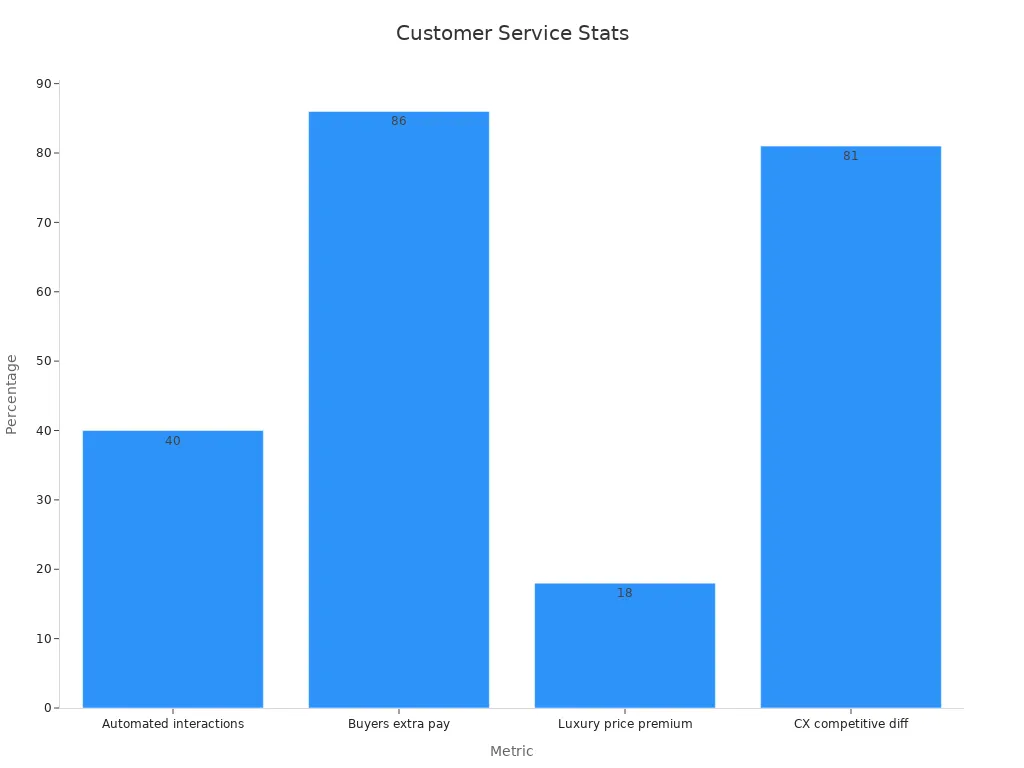
With 40% of customer interactions now automated through AI and 86% of buyers willing to pay more for great customer experiences, it’s clear that specialized roles are becoming essential.
Whether you’re drawn to general or specialized roles, the types of customer service roles available today offer plenty of opportunities to grow your career.
How Sobot’s Voice/Call Center Enhances Customer Service Roles
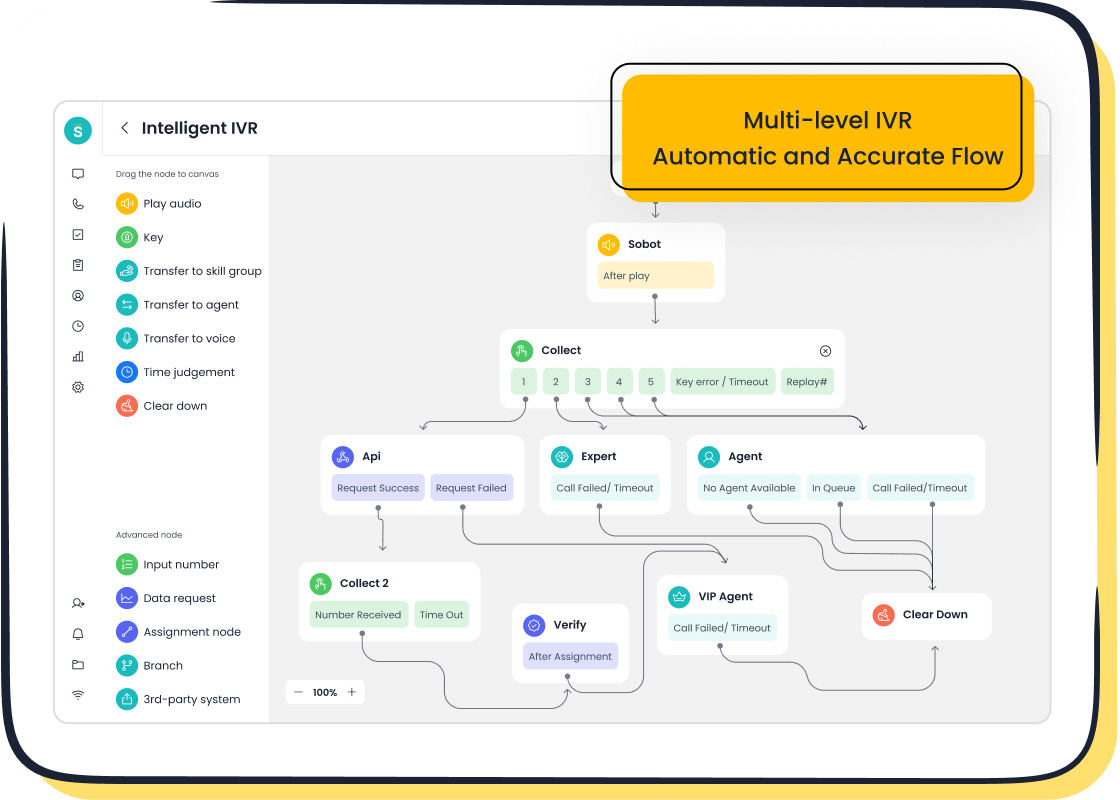
When it comes to excelling in customer service roles, having the right tools can make all the difference. That’s where Sobot’s Voice/Call Center steps in. It’s not just a platform; it’s your secret weapon for delivering exceptional customer experiences while making your job easier and more efficient.
Boosting Efficiency with Smart Features
Imagine having a system that does the heavy lifting for you. Sobot’s Voice/Call Center offers features like Intelligent IVR (Interactive Voice Response) and Smart Call Routing. These tools ensure that calls go to the right person or team without wasting time. You can focus on solving customer problems instead of figuring out where the call should go.
The platform also includes AI-powered Voicebots. These bots handle repetitive queries, so you can spend more time on complex issues that require a human touch. This not only saves time but also improves the overall customer experience.
Improving Performance Metrics
Sobot’s Voice/Call Center doesn’t just help you work smarter; it also helps you track your success. Here’s how it improves key performance areas:
| Improvement Area | Description |
|---|---|
| Agent Adherence | Tracks how well you stick to schedules and protocols. |
| Shift Scheduling | Optimizes shift planning for better coverage. |
| Operational Efficiency | Enhances overall efficiency in call center operations. |
These improvements mean fewer missed calls, better time management, and happier customers.

Real-Time Insights for Better Decisions
One of the standout features is the real-time monitoring and analytics. You can see how you’re performing at any moment. Are calls being resolved quickly? Are customers satisfied? With this data, you can make adjustments on the fly to improve your results.
For example, if you notice a spike in call volume during certain hours, you can use the platform’s Bulk Outbound Task feature to manage follow-ups efficiently. This ensures no customer feels ignored, even during busy times.
A Global Solution for Modern Needs
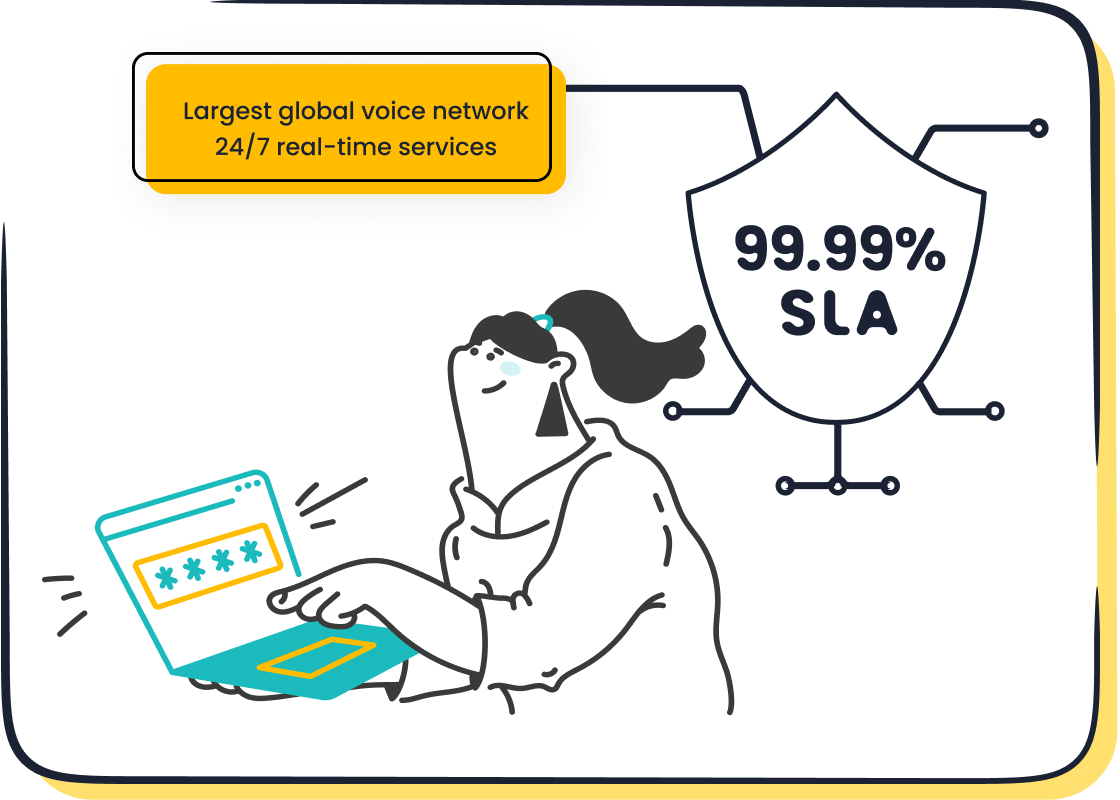
Sobot’s Voice/Call Center isn’t limited by geography. It offers global number availability and supports multiple time zones. Whether you’re assisting customers in New York or Tokyo, the system adapts to their needs. This makes it an excellent choice for businesses with international operations.
Plus, with a 99.99% uptime, you can rely on the platform to be there when you need it most. No more worrying about system crashes or downtime affecting your work.
Why It Matters for Your Career
Using Sobot’s Voice/Call Center doesn’t just benefit the company you work for—it benefits you. By leveraging its advanced features, you can improve your KPIs, gain valuable skills, and stand out in your role. Whether you’re a customer service representative or a team leader, this tool helps you shine.
So, if you’re looking to take your customer service career to the next level, Sobot’s Voice/Call Center is the partner you need. It’s not just about answering calls; it’s about transforming the way you work and delivering results that matter.
Building a Successful Customer Service Career
Essential Skills for Customer Service Professionals
To thrive in a customer service career, you need more than just technical know-how. Essential skills like problem-solving, empathy, and prioritization are the backbone of success. These abilities help you build strong customer relationships and deliver exceptional customer experiences.
Here’s how these skills impact your performance:
- Active Listening: Customers feel heard when you truly understand their concerns.
- Empathy: Connecting with customers on a personal level fosters trust and loyalty.
- Prioritization: Managing issues effectively ensures timely resolutions, even during busy periods.
Developing these customer service skills can transform you into a standout customer service professional. For example, Sobot’s AI-powered tools can enhance your problem-solving abilities by automating repetitive tasks, freeing up time for complex issues.
The Role of Empathy and Communication in Customer Service
Empathy and strong communication skills are the heart of customer service excellence. They’re not just nice-to-have traits—they’re essential for building lasting customer relationships.
Studies show that 80% of consumers prefer brands that offer personalized interactions. Empathy allows you to understand and share customers’ feelings, while effective communication ensures clarity and resolution.
| Best Practice | Description |
|---|---|
| Regular Training | Focus on empathy, active listening, and communication skills. |
| Feedback Loops | Use emotional metrics to identify frustration and tailor support strategies. |
For example, Sobot’s Omnichannel Solution empowers you to personalize communication across multiple channels. It integrates emotional metrics, helping you proactively address customer concerns. This approach not only improves customer satisfaction but also strengthens customer relationships.
Leveraging Sobot’s Omnichannel Solutions for Career Growth
Sobot’s Omnichannel Solution isn’t just a tool—it’s a career path accelerator. By using its advanced features, you can enhance your customer service skills and open doors to new opportunities.
Here’s what Sobot’s solution offers:
- Efficiency Boost: AI-driven automation reduces waiting times by 35%, allowing you to focus on meaningful interactions.
- Performance Metrics: With a CSAT score of 97% and a problem resolution rate of 85%, you can showcase your ability to deliver results.
- Global Reach: Serve customers worldwide with seamless integration across channels.
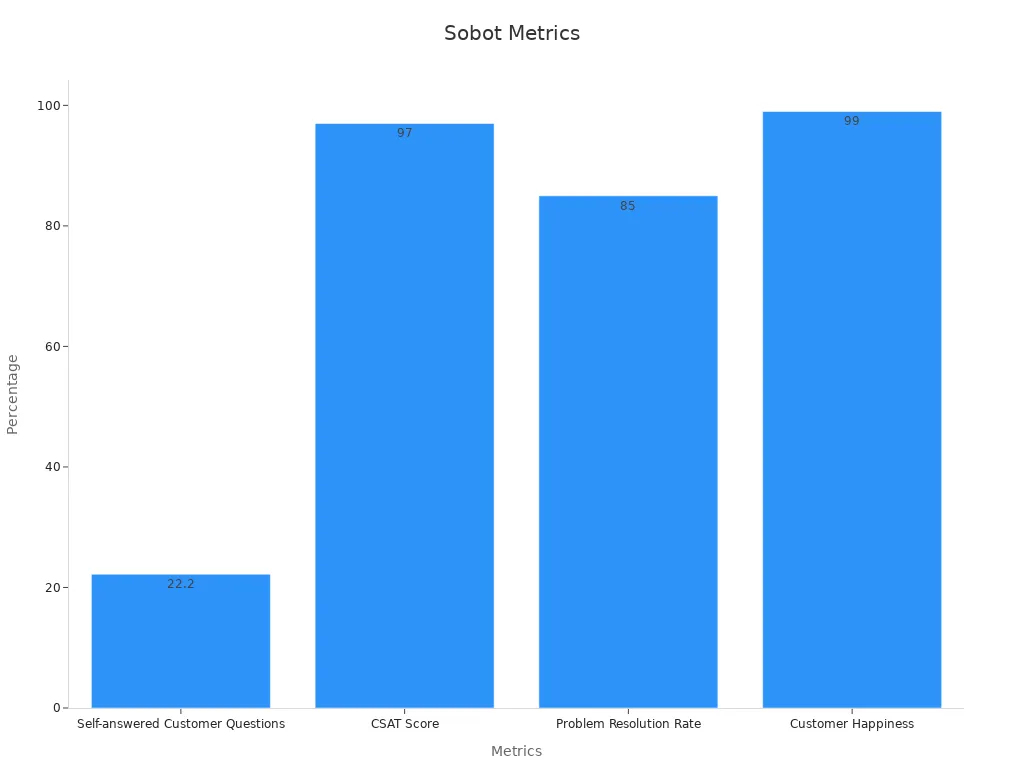
By leveraging Sobot’s tools, you can improve your problem-solving abilities, gain leadership experience, and advance your career path. Whether you’re a customer service representative or aiming for a managerial role, Sobot’s solutions help you stand out in the competitive customer support industry.
Matching Your Skills and Goals to the Right Role
Assessing Personal Strengths and Weaknesses
Finding the right customer service role starts with understanding yourself. What are your strengths? What areas need improvement? Knowing these answers can help you choose a role that fits your abilities and sets you up for success.
Studies show that aligning your strengths with your job can lead to incredible results:
- Sales can increase by 10% to 19%.
- Profits may rise by 14% to 29%.
- Customer engagement improves by 3% to 7%.
- Employee engagement grows by 9% to 15%.
These numbers prove that when you play to your strengths, everyone wins—customers, employers, and you.
To assess your strengths and weaknesses, start by asking yourself questions like:
- Do I enjoy solving problems?
- Am I good at staying calm under pressure?
- Can I communicate clearly and effectively?
If you’re unsure, tools like personality assessments and emotional intelligence tests can provide valuable insights.
Aligning Career Aspirations with Customer Service Opportunities
Your career aspirations matter. Whether you dream of becoming a customer service representative or moving into a specialized role, aligning your goals with available opportunities is key.
Think about what excites you. Do you love helping people directly? A general customer service role might be perfect. Are you tech-savvy and enjoy troubleshooting? Technical support could be your calling.
Here’s how aligning your aspirations with opportunities can benefit you:
- You’ll feel more motivated and engaged.
- You’ll develop skills that match your long-term career goals.
- You’ll find greater satisfaction in your work.
Take time to explore different customer service jobs. Look at job descriptions, required skills, and growth potential. For example, roles like ecommerce specialists are growing fast due to the rise of online shopping.
If you’re unsure where to start, consider using career planning tools like O*NET Career Exploration Tools. These resources help you identify your interests and abilities, making it easier to find opportunities that align with your goals.
Tools for Self-Assessment and Career Planning
Self-assessment tools are your best friend when it comes to planning your career. They help you understand your strengths, weaknesses, and preferences, giving you a clear direction.
Here are some popular tools to consider:
- Personality Assessments
- Emotional Intelligence (EQ) Assessments
- 360-Degree Feedback
Each tool offers unique benefits. For example:
| Assessment Tool | Description | Impact on Customer Service |
|---|---|---|
| Myers-Briggs Type Indicator (MBTI) | Classifies individuals into 16 personality types | Reported 25% increase in team effectiveness |
| Big Five Personality Test | Measures Openness, Conscientiousness, Extraversion, Agreeableness, Neuroticism | 60% of employers believe it enhances team dynamics |
| Emotional Intelligence Assessments | Measures emotional regulation, empathy, and social awareness | Accounts for 58% of job performance across fields |
| 360-Degree Feedback | Collects feedback from various sources | Identifies strengths and areas for development from multiple perspectives |
These tools don’t just help you understand yourself—they also show employers how you can contribute to their team.
Career planning resources like O*NET Career Exploration Tools go a step further. They help you match your skills and interests with specific customer service jobs. While assessments can’t guarantee job satisfaction, they provide a solid foundation for making informed decisions.
Tip: Combine self-assessment tools with real-world experience. Internships and entry-level roles can give you a taste of different opportunities, helping you refine your career path.
By using these tools and resources, you’ll gain clarity about your strengths, align your aspirations with the right opportunities, and set yourself up for a successful career in customer service.
Preparing for Customer Service Roles

Crafting a Winning Resume for Customer Service Positions
Your resume is your first chance to make a great impression. To stand out, focus on showcasing your achievements and aligning your skills with the job description. Use specific metrics to highlight your impact. For example, instead of saying, “Handled customer complaints,” you could say, “Resolved 95% of customer complaints on the first call, improving satisfaction scores by 20%.”
Here’s what makes a winning customer service resume:
| Key Element | Description |
|---|---|
| Quantifying Your Impact | Use metrics like customer satisfaction ratings or reduced call handle times to show results. |
| Match Your Skills To The Job | Highlight skills like CRM software proficiency or data entry that match the job description. |
| Adapt To Industry Trends | Include terms like “social media support” to show you’re up-to-date with current practices. |
Tailor your resume for each role. This shows employers you’ve done your homework and are serious about the position.
Gaining Experience Through Internships and Entry-Level Roles
If you’re just starting, internships and entry-level roles are your best bet. They give you hands-on experience and help you build essential skills like communication and problem-solving. Many companies offer training programs, so you’ll learn on the job while contributing to the team.
To prepare, focus on these best practices:
- Get the first touchpoint right by delivering excellent service from the start.
- Maximize data collection by learning from customer reviews and surveys.
- Be proactive. Anticipate customer needs and offer solutions before they ask.
Remember, 76% of customers abandon a brand after three bad experiences. By practicing these strategies, you’ll not only gain experience but also learn how to keep customers happy.
Preparing for Interviews in Customer Service
Interviews can feel nerve-wracking, but preparation makes all the difference. Structured interviews are common in customer service hiring because they’re fair and consistent. They also help you feel more confident since you’ll know what to expect.
| Evidence Type | Description |
|---|---|
| Fair and Ethical Hiring Practices | Structured interviews reduce biases and ensure fairness. |
| Candidate Experience | They provide a clear process, boosting your confidence. |
To prepare, practice answering common questions like, “How would you handle an upset customer?” Use examples from your experience to show your problem-solving skills. Structured interviews also focus on your ability to stay calm under pressure, so highlight moments when you turned a negative situation into a positive one.
Tip: Research the company beforehand. Knowing their values and services will help you tailor your answers and show you’re the perfect fit.

How Sobot’s AI-Powered Solutions Can Boost Your Career Readiness
Are you ready to stand out in the competitive world of customer service? Sobot’s AI-powered solutions can give you the edge you need to succeed. These tools don’t just make your job easier—they help you build skills that employers value.
Automate Repetitive Tasks
Imagine spending less time on routine tasks and more time solving real problems. Sobot’s AI-powered Voicebot handles repetitive queries like order tracking or FAQs. This frees you up to focus on complex issues that require critical thinking. Employers love candidates who can tackle challenges head-on, and Sobot’s tools help you develop that expertise.
Gain Real-Time Insights
Sobot’s solutions provide real-time analytics, giving you instant feedback on your performance. For example, the Unified Workspace consolidates customer data, so you can personalize interactions and resolve issues faster. This not only improves customer satisfaction but also boosts your confidence in handling tough situations.
Tip: Use these insights to track your progress. If you notice areas for improvement, adjust your approach and watch your skills grow.
Build Global Experience
With Sobot’s Global Number Availability and time zone support, you can assist customers from around the world. This exposure helps you develop cultural awareness and adaptability—two traits that are essential in today’s globalized job market.
Why It Matters
Companies increasingly rely on AI to enhance customer service. By mastering Sobot’s tools, you’ll stay ahead of industry trends and position yourself as a tech-savvy professional. Whether you’re just starting or looking to advance, Sobot’s AI-powered solutions can make your career journey smoother and more rewarding.
Ready to take the next step? Explore Sobot’s tools here and start building your future today.
Avoiding Common Pitfalls in Customer Service Careers
Overlooking the Importance of Soft Skills
Soft skills are the secret sauce of a successful customer service career. While technical training is essential, ignoring soft skills can hold you back. Imagine trying to calm an upset customer without empathy or resolve a misunderstanding without clear communication. It’s tough, right?
Many companies focus heavily on technical skills but overlook the importance of soft skills. This often leads to missed opportunities and frustrated clients. For example:
- Professionals with strong technical abilities may struggle to explain their value to customers.
- SEO specialists often face challenges in showing how their work impacts a business, which can strain relationships.
Soft skills like active listening, patience, and adaptability help you connect with customers on a deeper level. They’re not just nice to have—they’re essential for building trust and loyalty. If you want to stand out as a customer service representative, honing these skills is a must.
Choosing Roles Without Understanding Responsibilities
Jumping into a role without fully understanding its responsibilities can lead to frustration and burnout. Each customer service role has unique demands, and not every position will align with your strengths or career goals.
For instance, a technical support role might require advanced troubleshooting skills, while a customer satisfaction manager focuses on improving user experiences. If you choose a role that doesn’t match your abilities, you might feel overwhelmed or underprepared.
Common pitfalls include:
- Over-promising and under-delivering, which can damage trust.
- Providing inconsistent information, leading to customer confusion.
- Struggling with hard-to-navigate support systems, which frustrates both you and the customer.
Before committing to a role, take time to research its responsibilities. This ensures you’re stepping into a position where you can thrive and make a meaningful impact.
Neglecting Industry Trends and Technological Advancements
The customer service industry is evolving rapidly. Neglecting trends and new technologies can leave you behind. Did you know that 93% of customer service teams say customer expectations are higher than ever? Or that 71% of customer support leaders have seen a rise in contact volume since 2020?
| Statistic/Trend | Description |
|---|---|
| Customer Expectations | 93% of customer service teams agree that customer expectations are higher. |
| Negative Experiences | 80% of people regularly encounter negative customer service experiences. |
| Increased Contact Volume | 71% of customer support leaders report higher contact volumes since 2020. |
Staying updated on industry trends helps you adapt to changing customer needs. For example, tools like AI-powered chatbots and omnichannel platforms streamline processes and improve customer satisfaction. By embracing these advancements, you’ll not only enhance your skills but also position yourself as a forward-thinking professional.
Tip: Keep an eye on emerging technologies and customer behavior patterns. This proactive approach will help you stay ahead in your career.
How Sobot’s Cloud Call Center Helps Professionals Stay Ahead
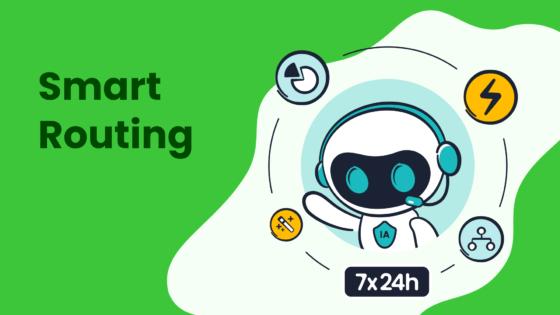
Staying ahead in customer support means using tools that make your job easier and more effective. That’s where Sobot’s Cloud Call Center comes in. It’s designed to help you work smarter, not harder, by offering features that improve efficiency, performance, and customer satisfaction.
One standout feature is Intelligent IVR (Interactive Voice Response). It lets you customize greetings, create call menus, and route calls to the right person or team. This means customers get faster answers, and you can focus on solving their problems instead of managing call logistics. Plus, with AI-powered Voicebots, repetitive tasks like answering FAQs are automated, freeing up your time for more complex issues.
Sobot’s real-time analytics give you instant insights into your performance. For example, you can track metrics like call resolution rates and response times. If you notice a dip in performance, you can adjust your approach immediately. This kind of data-driven decision-making helps you continuously improve and deliver better results.
Another game-changer is the platform’s global number availability. Whether you’re assisting customers in your local area or halfway across the world, Sobot’s system adapts to different time zones. This makes it easier to provide seamless support to international clients.
With a 99.99% uptime, you don’t have to worry about system crashes disrupting your work. The platform’s stability ensures you’re always ready to assist customers, no matter the time or place.
By using Sobot’s Cloud Call Center, you’ll not only enhance your skills but also stand out as a forward-thinking professional. It’s more than just a tool—it’s your partner in building a successful career in customer support.
Choosing the right customer service role can transform your career. It’s not just about finding a job—it’s about unlocking opportunities for growth, skill development, and meaningful impact. Whether you aim to become a customer service representative or explore specialized roles, aligning your strengths with your goals is key.
Take time to assess your abilities and aspirations. Use tools like self-assessments and career planning resources to guide your path. Remember, effective customer support drives business success, and Sobot’s solutions empower you to excel. With tools like AI-powered Voicebots and omnichannel platforms, you’ll gain the edge to thrive in this dynamic field.
| Evidence | Description |
|---|---|
| Career Path Expansion | The customer service field has evolved, offering diverse roles that contribute to a rewarding career. |
| Skill Development | Customer service roles enhance skills that are transferable across various careers. |
| Business Impact | Effective customer service is linked to revenue growth and customer retention, highlighting its importance in business success. |
Start your journey today and make your career in customer service unforgettable.
FAQ
What is the difference between a customer service representative and customer support?
A customer service representative focuses on helping customers with general inquiries, purchases, or complaints. Customer support, on the other hand, often involves solving technical issues or providing specialized assistance for products or services.
How can I improve my communication skills for customer service roles?
Practice active listening, use clear and simple language, and stay calm under pressure. Role-playing common scenarios can also help you prepare for real-life interactions.
Are soft skills more important than technical skills in customer service?
Soft skills like empathy and communication are essential for building trust and resolving issues. While technical skills are important, soft skills often make the biggest difference in creating positive customer experiences.
What tools can help me succeed in customer service roles?
Tools like Sobot’s AI-powered solutions can streamline your workflow. Features like real-time analytics and automated responses allow you to focus on meaningful customer interactions while improving efficiency.
How do I know if a customer service role is right for me?
Ask yourself if you enjoy problem-solving, communicating with people, and staying calm under pressure. If you thrive in fast-paced environments and love helping others, a customer service role might be a great fit.
See Also
Essential Principles for Effective Call Center Quality Management
Transforming Customer Support with AI-Powered Service Agents
2024's Leading Customer Service Software Solutions Reviewed
